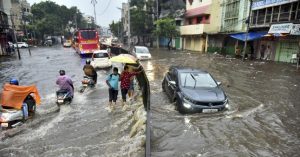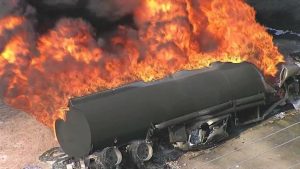Tragedy in Plain Sight: The Rise of Fatal Accidents in Nigeria Amidst Political Unrest
Introduction
Nigeria is currently witnessing a troubling increase in fatal accidents, from tanker explosions and ferry drownings to catastrophic floods. These incidents have resulted in thousands of deaths and extensive property damage. Strikingly, many of these disasters appear to coincide with major political events, leading to widespread speculation about their true causes. Could it be due to simple negligence, or are there more complex, even sinister, forces at play? This editorial seeks to explore the alarming surge in accidents and the troubling questions they raise about governance and safety in Nigeria.
Human Error and Infrastructure Failures
Human error and the failure of critical infrastructure have long been recognized as contributing factors to Nigeria’s frequent disasters. For example, the floods of 2022 claimed 612 lives, displaced 1.4 million people, and affected over 2.5 million individuals. The 2023 floods continue this disturbing trend, with 157,000 people affected, displacing 68,000 residents in Adamawa, Plateau, and Lagos states.

The government’s failure to prepare for disasters, despite repeated warnings from experts, highlights its inability to protect citizens from predictable natural events. Flooding, which occurs annually, continues to devastate communities due to inadequate drainage systems and poorly constructed infrastructure. While natural events such as heavy rains contribute to flooding, the lack of proactive policies and oversight has compounded these tragedies.
Recurring Disasters and Regulatory Lapses
Disasters resulting from human negligence have become tragically common in Nigeria. In May 2023, a gas explosion in Jos claimed 12 lives, and just one month later, a tanker explosion in Lagos led to significant deaths and destruction. Nigeria’s continued inability to enforce safety standards in industries dealing with hazardous materials reflects a deeper systemic failure in governance.

Beyond explosions, ferry drownings are another frequent cause of death. For instance, in August 2023, seven people died when a ferry capsized in Lagos. Waterway safety regulations are poorly enforced, and operators often overload ferries beyond capacity, leading to predictable but preventable disasters. This tragedy followed multiple similar incidents in the previous two years, including a ferry capsize in 2021 that killed 15 passengers and another in 2020 that claimed 10 lives.
Building Collapses and Other Urban Disasters
Another frequent type of disaster in Nigeria is building collapses. Poorly regulated construction practices, combined with corruption in building approvals, have led to numerous fatal incidents. In June 2023, four people were killed when a building collapsed in Abuja. These incidents mirror the devastating building collapse in Lagos in 2019, where 20 people lost their lives.

Beyond building collapses and ferry incidents, pipeline explosions have also been a cause of great concern. In 2020, Lagos witnessed a pipeline explosion that killed 15 people. Similar pipeline disasters continue to plague various regions of Nigeria, with hundreds of lives lost due to inadequate maintenance and unsafe practices in the oil industry.
Political Timing and Speculation
What sets these incidents apart from mere accidents is their curious timing. Several of these large-scale tragedies have occurred just before or after major political events, such as elections or the introduction of contentious policies. For example, the recent spate of accidents occurred close to the implementation of new economic policies that have drawn widespread criticism. This has led many to speculate about the involvement of dark political forces.
Although no concrete evidence exists, the rumors surrounding occult practices and human sacrifices among Nigeria’s political elite refuse to fade away. Such speculation stems from long-standing beliefs in certain regions that leaders resort to ritualistic practices to gain and maintain power. Whether these rumors hold any weight or not, the government’s inability to prevent these tragedies fuels suspicion.
Government Accountability and the Need for Reform
The Nigerian government’s response to these recurring disasters has been disappointing. Despite the number of lives lost and the significant property damage incurred, little has been done to prevent similar incidents in the future. Weak enforcement of safety standards and the absence of disaster preparedness plans make Nigeria a breeding ground for such tragedies.
Calls for greater accountability have been met with half-hearted reforms and little action. The government’s focus appears to be more on political survival than on protecting the lives of its citizens. Without significant changes to policy enforcement, better infrastructure, and transparent governance, these accidents will likely continue unabated.
Global Comparison: A Missed Opportunity
Nigeria’s struggles with fatal accidents are not unique, as countries like Bangladesh and India also face significant challenges in managing disasters. However, both nations have demonstrated a willingness to learn from past tragedies. In Bangladesh, the 2013 Rana Plaza collapse, which killed over 1,100 people, led to stricter building regulations and improvements in construction safety standards. Similarly, India has taken steps to improve disaster preparedness, particularly in flood-prone areas.
In contrast, Nigeria lags far behind in disaster management. While other nations have made progress, Nigeria continues to grapple with the same issues year after year, with no significant improvements in sight. This lack of accountability not only costs lives but also hampers the country’s growth and development.
Conclusion: A Call for Change
The rising number of fatal accidents in Nigeria is a reflection of deeper systemic failures in governance, infrastructure, and public safety. Whether these incidents are caused by human error, political negligence, or something more sinister, one thing is clear: urgent reforms are needed. It is time for the Nigerian government to take proactive steps to ensure the safety of its citizens, to prevent further disasters, and to put an end to the needless loss of life.
As citizens, we must continue to hold our leaders accountable and demand transparency in the face of these tragedies. Only through collective action and reform can Nigeria hope to break the cycle of disaster and move towards a safer future.
Nathaniel Otis (nathotisz@gmail.com)

